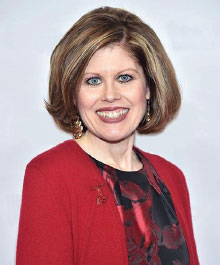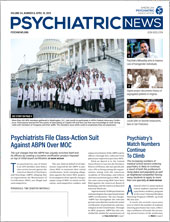Corporate CEOs convened by the American Heart Association (AHA) are promoting “Seven Actionable Strategies for Building a Mental Health– Friendly Workplace.”
The seven strategies, outlined in “Mental Health: A Workforce in Crisis,” released last month by the AHA’s CEO Roundtable, are part of an employer action plan to build a culture that supports the mental health of their employees.
“People are an organization’s most important asset, and investing in a person’s overall health can improve health outcomes, engagement, and performance,” Nancy Brown, CEO of the AHA, told Psychiatric News. “Our market research shows that employees expect their employer to provide an environment that supports their overall health and that mental health is deemed as important as physical health.”
The Roundtable is a group of 40 corporate leaders formed in 2013 to implement evidence-based approaches to workplace health that focus on employee engagement and building a corporate culture of health.
The American Psychiatric Association Foundation (APAF) Center for Workplace Mental Health is a key stakeholder in the Roundtable.
APAF Director Dan Gillison participated in a meeting of the Roundtable last month at Bank of America headquarters in New York, where he and other leaders outlined how to implement the seven strategies in corporate workplaces.
“This was really about how to put ‘boots on the ground’ to make the support of mental health in America’s offices and factories a reality,” Gillison said. “These corporate leaders are eager to have the input of APA and the Foundation, and they recognize the need to incorporate access to quality psychiatric care as part of the health benefits they offer to employees. We look forward to continuing collaboration with the AHA Roundtable.”
The Roundtable is supported by an “expert panel” that includes Darcy Gruttadaro, director of the APAF Center for Workplace Mental Health. The panel was instrumental in developing these seven strategies:
•
Leadership: Visibly position leaders to be proactive champions of a diverse and inclusive culture that supports a mental health–friendly workplace.
•
Organizational and environmental support: Develop and implement a mental health plan that is easy for all employees to access and understand.
•
Communications: Communicate clearly and often to employees about the organization’s mental health policies, medical benefits, programs, education resources, and training opportunities.
•
Programs and benefits: Offer a comprehensive package of employee-centered medical benefits and programs.
•
Engagement: Involve employees in all aspects of mental health–related workplace decision making.
•
Community partnership: Leverage community partnerships to promote the internal and external objectives of the mental health plan.
•
Reporting outcomes: Identify evidence-based opportunities to continually improve the mental health and well-being of employees.
Gruttadaro said the goals and objectives of the Roundtable align well with the mission of the APAF center. “Our ongoing partnership with the AHA Roundtable really advances the work of the center, which is all about helping employers, business groups on health, health-focused coalitions, and other strategic partners solve challenges and highlight innovative approaches to improving workplace mental health and making it a higher organizational priority.”
AHA’s Brown said Roundtable members believe it is crucial to create a cultural norm in which employees are comfortable coming forward with problems or issues regarding mental health, and supervisors are equipped to recommend resources for employees to get the help they need.
“Training leaders and managers to mitigate the stigma associated with mental health by inviting open and transparent conversation is a promising organizational shift that can help build a mental health–friendly workplace,” she told Psychiatric News. “All leaders can walk the talk and support employees to have open conversations about mental health issues and inspire managers to foster environments that are supportive and encourage proactive action and treatment when needed.”
She added, “We are continuing an important dialogue with the APAF’s Center for Workplace Mental Health and believe that the AHA’s CEO Roundtable can help amplify the APAF’s key messages incorporated in the recent report.” ■
“Mental Health: A Workplace in Crisis” can be accessed
here. Information about the CEO Roundtable is available
here. Information about the APAF Center for Workplace Mental Health is posted
here.

